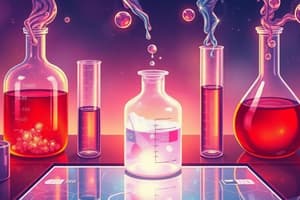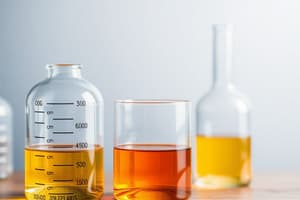Podcast
Questions and Answers
What is a solution?
What is a solution?
- A pure solid without any solvent
- A mixture of solvent and solute (correct)
- A mixture of solute and solvent
- A pure liquid without any solute
Which expression of concentration is based on 1000 parts, mol wt per litre solvent?
Which expression of concentration is based on 1000 parts, mol wt per litre solvent?
- Percent
- Molarity (correct)
- Molality
- Normality
What is the number of moles of substance in 1 Litre of solvent called?
What is the number of moles of substance in 1 Litre of solvent called?
- Molarity (correct)
- Molality
- Percent
- Normality
What is a mole in chemistry used for measuring?
What is a mole in chemistry used for measuring?
What is the molecular weight of KCl?
What is the molecular weight of KCl?
Which concentration expression is based on 1000 parts, eq per liter solvent?
Which concentration expression is based on 1000 parts, eq per liter solvent?
How many moles are in 81.97 g of KCl?
How many moles are in 81.97 g of KCl?
What is the molarity of a solution containing 4 moles of HCl in 2 liters of solution?
What is the molarity of a solution containing 4 moles of HCl in 2 liters of solution?
How would you prepare a 0.2 M solution of NaCl using 250 mL?
How would you prepare a 0.2 M solution of NaCl using 250 mL?
How much of a 0.5 M solution can be made from 100 mL of 2 M solution?
How much of a 0.5 M solution can be made from 100 mL of 2 M solution?
Flashcards
Solution
Solution
A mixture of a solvent and a solute.
Molarity
Molarity
Concentration in moles of solute per liter of solution.
Moles in 1 Liter
Moles in 1 Liter
The number of moles of a substance in one liter of solution.
Mole in Chemistry
Mole in Chemistry
Signup and view all the flashcards
Molecular Weight of KCl
Molecular Weight of KCl
Signup and view all the flashcards
Normality
Normality
Signup and view all the flashcards
Moles of KCl (81.97 g)
Moles of KCl (81.97 g)
Signup and view all the flashcards
Molarity of 4 moles HCl in 2 liters
Molarity of 4 moles HCl in 2 liters
Signup and view all the flashcards
0.2 M NaCl (250 mL)
0.2 M NaCl (250 mL)
Signup and view all the flashcards
2 M to 0.5 M (100 mL)
2 M to 0.5 M (100 mL)
Signup and view all the flashcards
Study Notes
Solutions
- A solution is a homogeneous mixture of two or more substances.
- The substance present in a larger amount is called the solvent.
- The substance present in a smaller amount is called the solute.
Concentration
- Molality expresses concentration as moles of solute per 1000 g of solvent.
- Molarity expresses concentration as moles of solute per 1000 ml (1 liter) of solution.
- Normality expresses concentration as gram equivalent weight of solute per 1000 ml (1 liter) of solution.
Moles
- A mole is a unit of measurement used in chemistry to express amounts of a chemical substance.
- One mole of a substance contains 6.022 x 10^23 particles (Avogadro's number).
Molar Mass
- The molecular weight of KCl is 74.55 g/mol (atomic weight of K + atomic weight of Cl = 39.10 g/mol + 35.45 g/mol).
Calculating Moles
- To calculate the number of moles in a given mass of a substance, divide the mass by the substance's molar mass.
- Number of moles of KCl in 81.97 g is 1.1 mol (81.97 g / 74.55 g/mol).
Molarity
- Molarity is defined as the number of moles of solute per liter of solution.
- The molarity of a solution containing 4 moles of HCl in 2 liters of solution is 2 M (4 mol / 2 L).
Preparing Solutions
- To prepare a 0.2 M solution of NaCl using 250 mL, you would dissolve 2.92 g of NaCl in 250 mL of water.
- To calculate the mass of NaCl needed, first calculate the moles of NaCl required for the solution (0.05 mol), then multiply by the molar mass of NaCl (58.44 g/mol).
Dilution
- To calculate the volume of a diluted solution, the equation M1V1 = M2V2 can be used.
- Using this equation, you can calculate that 400 mL of a 0.5 M solution can be made from 100 mL of a 2 M solution.
Studying That Suits You
Use AI to generate personalized quizzes and flashcards to suit your learning preferences.




